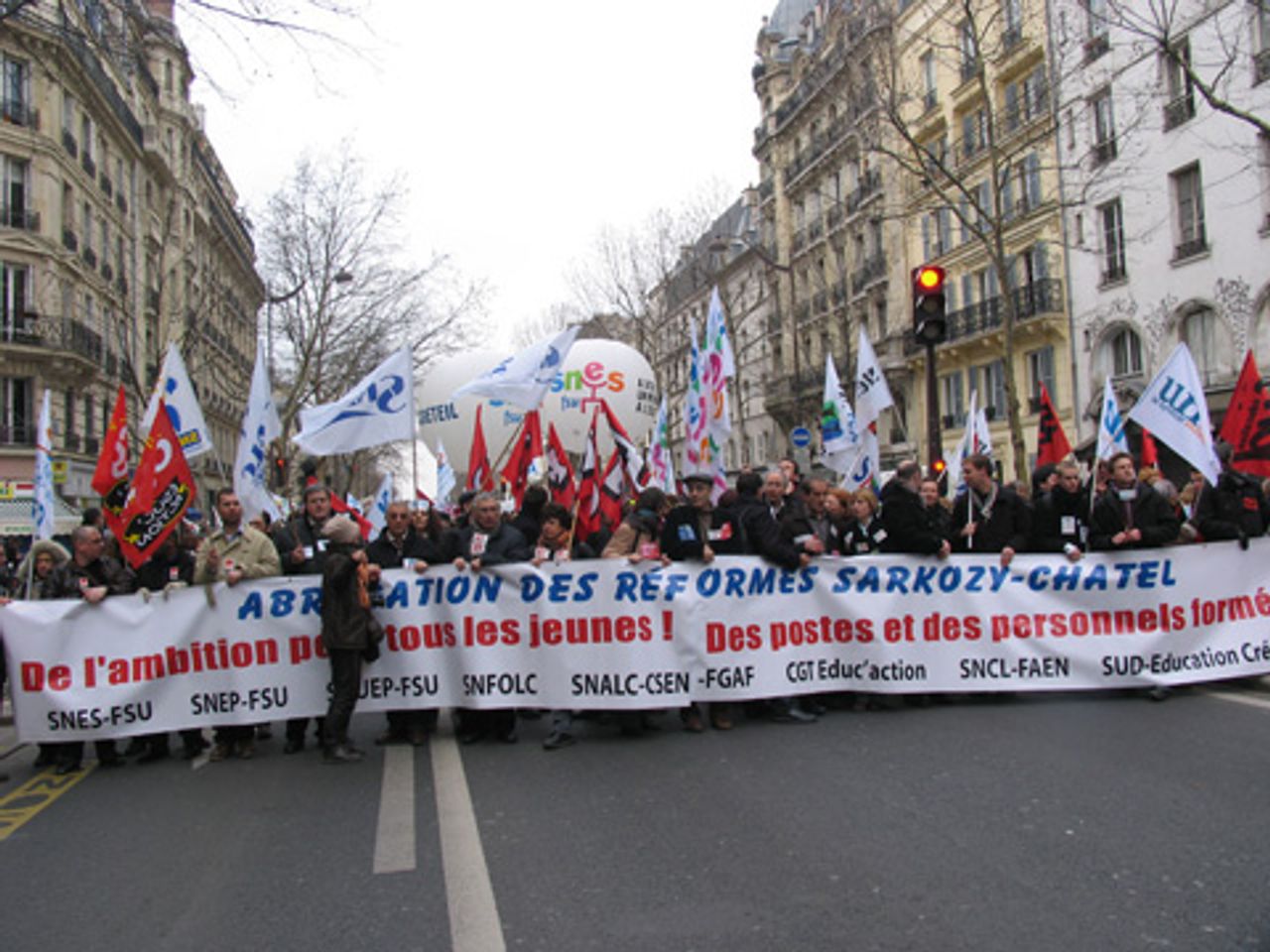On March 12, thousands of students, teachers and parents took to the streets across France to protest education “reforms,” deteriorating working conditions, and job cuts.
The national strike and and demonstrations throughout France were called by eight education unions. According to SNES-FSU, the main union in secondary education, 50 percent of the teachers struck in collèges (students aged 11 to 15) and in lycées (students aged 16 to 18). The press estimated that 60 demonstrations took place—including in Paris, Marseille, Lyon, Sarreguemines, Toulouse, Nice, Reims and Metz.
Students and teachers fear cuts to education budgets and hours of instruction, attempts to make public schools compete with private schools, and that the reform will undermine their diploma’s credibility with employers. The reform is designed to rearrange high school curricula with a reduction of hours of instruction in mathematics, physics and chemistry for scientific students in the 2nd year of high school. History and geography would be eliminated in the Terminale S (the final year of high school for science students).
They also oppose plans to eliminate 16,000 jobs in education this year. This would bring the number of education jobs cut in the last three years to 50,000. The reform would give more power to school principals, who would manage an important part of the budget and hiring personnel. It would also lead to staff cuts—“three or four positions could be cut in each school,” SNES noted.
Teachers and students were also outraged by a recent statement of Education Minister Luc Chatel, who proposed to hire “young retirees and students to replace teachers who are absent.”
In Paris, according to teachers’ unions, 10,000 people participated in the demonstration.

The banner reads, “Abrogation of the Sarkozy-Chatel reforms, ambition for all youth! For jobs and well-trained personnel!” Another banner protested: “Firesale in education—Jobs, student success, training, funding: everything has to go.”
WSWS supporters participated in the Paris demonstration and distributed the leaflet, “The European strikes and the trade unions.” They spoke with students and teachers.
One teacher told the WSWS, “The right has launched its program to dismantle secondary and university education. It is opening education to the private sector. We are going towards a more managerial way of running things, giving more power to school heads.”
The strike expresses growing working class opposition to government austerity policies, as governments across Europe move to slash workers’ living standards and reassure the banks after the outbreak of the Greek debt crisis. Last month France saw a wave of strikes in different sectors, including nationwide strikes in the refineries of oil giant Total, and by air traffic controllers and Air France staffs. The unions called off these struggles before workers’ demands were met.
The education cuts are part of a series of austerity measures prepared by President Nicolas Sarkozy. As in Greece, Sarkozy is preparing to make savage cuts in social spending to reduce the French budget deficit, which is expected to arrive at 8.2 percent of GDP this year. In February, Sarkozy announced that his government would implement a pension reform. This cut, which Sarkozy hopes to carry out by the end of 2010, will include lengthening the pay-in period beyond 41 and increasing the retirement age beyond 60.
The French government submitted to the European Commission in early February its stability programme for the period 2010-2013. It foresees a reduction in the public deficit from 8.2 percent to 3 percent of GDP by 2013, entailing a cut in government spending on the order of €100 billion. The programme included cuts in education and health care spending, pensions, unemployment benefits, and public sector employment.
The central difficulty facing workers is the political dominance of the unions and their apologists, who support the cuts and insist that strikes should limit themselves to calling for modifications to austerity packages.
On planned education cuts, SNES General Secretary Frédérique Rolet said, “Change yes, but not like this.” She suggested that the government might make further funding available for education this year, through a “budgetary collective.”
Fearing the emergence of political opposition to government cuts in the working class, the unions are dividing and isolating numerous struggles of the working class.
On March 11, public hospital staffs stuck against restructuring plans announced by AP-HP (Assistance publique-Hôpitaux de Paris). This would cost 4,000 jobs by 2012. Angry staff members blockaded the headquarters of AP-HP in Paris until the next day.
On the same day, public transport workers struck against subcontracting to private companies; nursery employees marched to oppose worsening working conditions in French daycare centres; nurses gathered in Paris to push for greater recognition of their qualifications, and to protest a change of the retirement age from 55 to 60.
On March 9, Magistrates, lawyers and prison wardens went on strike. Workers at the charity Emmaüs also called their first strike in the organization’s 60-year history.
Subscribe to the IWA-RFC Newsletter
Get email updates on workers’ struggles and a global perspective from the International Workers Alliance of Rank-and-File Committees.
